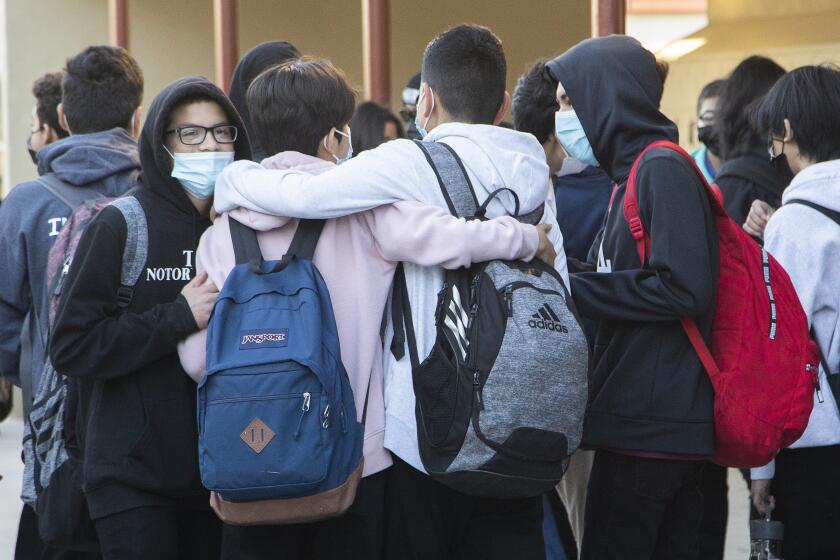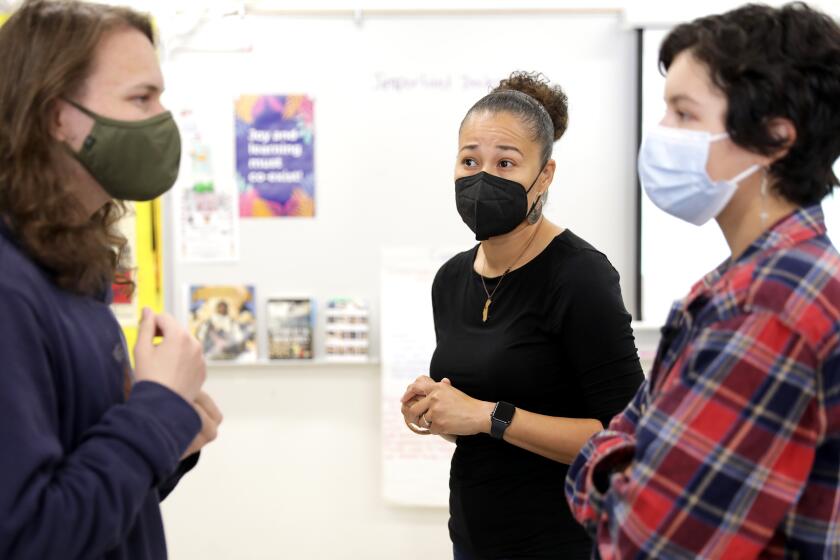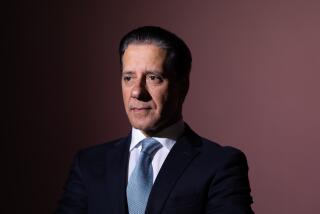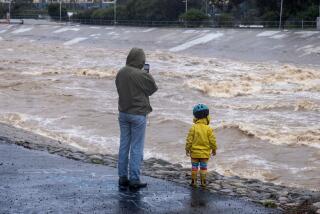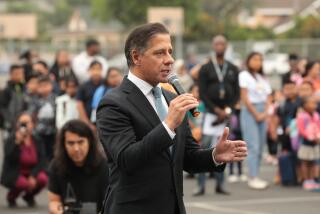Amid high absenteeism, incoming L.A. schools chief says campuses are safe
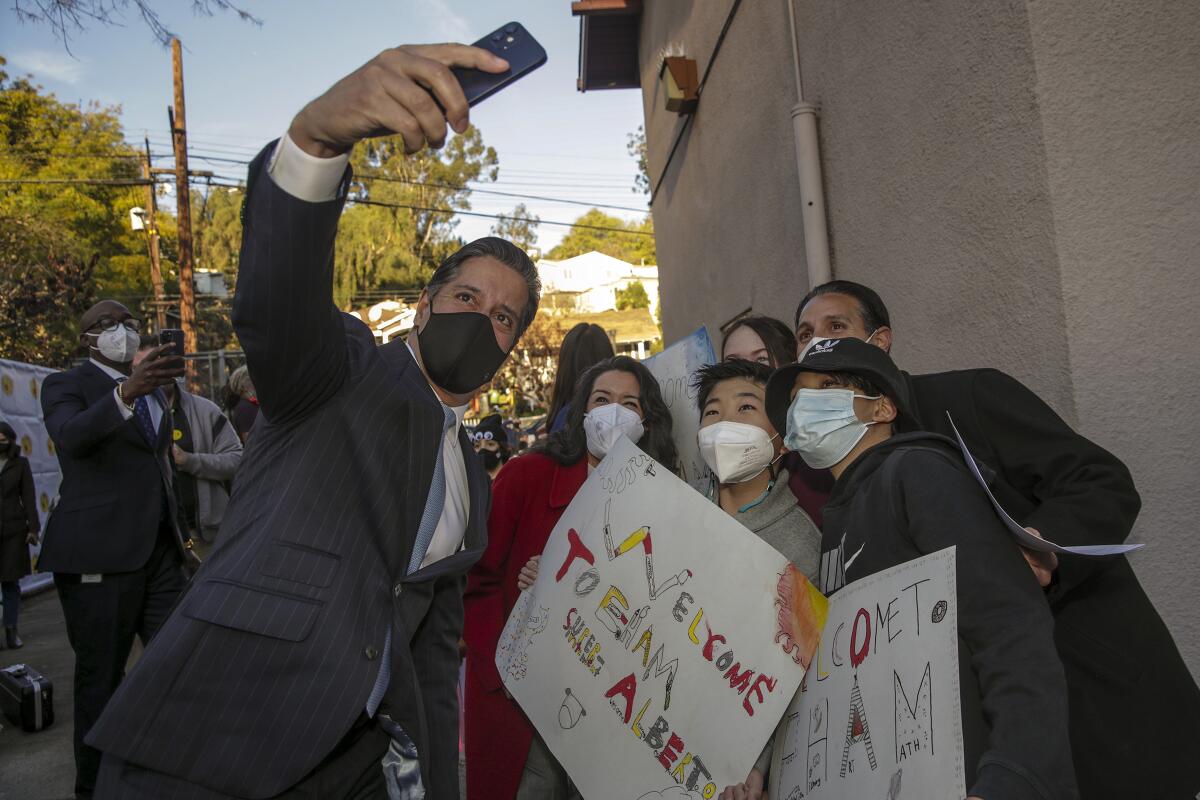
Incoming Los Angeles Unified Supt. Alberto Carvalho, who visited Friday as officials reported a 66.8% average student attendance rate, urged parents to send their children to school if they are not sick, saying campuses are safe and he fully supports the district’s coronavirus safety measures.
“They are safe places because of the protective measures that are in place here,” said Carvalho, during a welcome event at Elysian Heights Elementary Arts Magnet in Echo Park. “Parents need to understand that, they need to bring kids to school.”
For the record:
4:19 p.m. Jan. 18, 2022An earlier version of this story incorrectly stated that LAUSD reported a 66.8% average student absentee rate. It reported a 66.8% average attendance rate.
All schools have remained open for in-person learning this week.
About half of the 130,000 student absences are accounted for by those who tested positive for the coronavirus in the week before the start of the term. Others may have tested positive or had symptoms, but the information was not uploaded to the district’s health-screening system. There was no estimate regarding how many families are choosing to keep students home out of caution as case numbers remain at record rates due to the Omicron variant.
Carvalho said the issues confronting LAUSD amid surging coronavirus rates are also hitting Miami-Dade County Public Schools, the district he is leaving, causing elevated student absences and squeezing an already tight labor market for teachers and other school employees.
L.A. schools open amid omicron anxiety, absences, confusion
School board President Kelly Gonez said she understood the fear among many parents who aren’t ready to send their children back to in-person learning because of the high number of coronavirus cases.
“Yes, our positivity rates are higher to start the spring semester, but we’re seeing that trend in a positive direction,” Gonez said, referencing a decline in L.A. Unified students testing positive this week.
On Tuesday, when campuses reopened, 17% of students and 15% of LAUSD staff tested positive for the coronavirus, the district said. On Thursday, 15.6% of students tested positive while 13.3% of staff tested positive — still about 10 times the number of cases before winter break. The district operates the largest school coronavirus testing program in the nation, with more than 500,000 mandatory tests administered every week for all students and staff.
Despite the explosion in cases, fewer students who come in contact with an infected person are likely to be sent home to quarantine than in the fall under revised district policies that move toward a “test-to-stay” approach.
Students can remain in school if the exposure occurred at school while students were being supervised. The school also has to be able to verify that both the infected individual and the close contact were wearing masks properly. And the exposure has to occur at a school without an active infection outbreak — which is three or more cases thought to have been transmitted at the school within a 14-day period.
There is widespread confusion over who needs to stay home and how long because the rules are complicated and keep changing. The state issued updated guidelines this week — and on Thursday even Los Angeles County Public Health Director Barbara Ferrer said her department needed more time to analyze the changes. L.A. Unified issued rules to administrators on Jan. 7 and prepared revised rules that went into effect Friday, one week later.
One change in the state guidelines simplifies how schools deal with potential close contacts of those who are infected.
Instead of investigating each case and determining close contacts, schools instead can send out a communication to all who could have been potentially affected. For example, if a 10th-grade student goes to school with an infection, everyone in that student’s classes and activities would be notified. But no one else would automatically be sent home unless that person develops symptoms. Those potentially affected should be tested “within three to five days” after the last exposure, according to the state.
Carvalho said that data trends showing the Omicron surge is likely to subside in coming weeks will bring greater stability among staff and student attendance. He cautioned against moving too quickly to relax safety protocols in schools, saying he’s “concerned about the fact that as soon as conditions improve a little bit, we let our guard down, we go back to where we used to be.”
“We cannot allow that to happen,” he continued. “At stake is the viability of schools being open.”
Carvalho affirmed his support of the district’s efforts to keep schools open for in-person learning, saying the board “has done everything right in terms of protective actions for the benefit of students.”
Carvalho did not specify when he would officially take over as superintendent. He said he would move to Los Angeles sometime in early to mid-February to provide transition time for the Florida school district where he led as superintendent for 13 years.
‘Things accelerated too quickly,’ Supt. Quoc Tran said of the surge in coronavirus cases that has overtaxed the district of 7,100 students and 900 employees.
More to Read
Sign up for Essential California
The most important California stories and recommendations in your inbox every morning.
You may occasionally receive promotional content from the Los Angeles Times.
